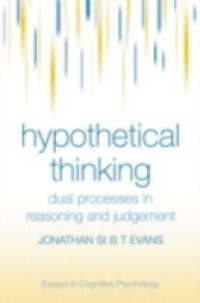Hypothetical thought involves the imagination of possibilities and the exploration of their consequences by a process of mental simulation. Using a recently developed theoretical framework called Hypothetical Thinking Theory, Jonathan St. B. T. Evans provides an integrated theoretical account of a wide range of psychological studies on hypothesis testing, reasoning, judgement and decision making. Hypothetical thinking theory is built on three key principles, implemented in a revised and updated version of Evans' well-known heuristic-analytic theory of reasoning. The central claim of this book is that this theory can provide an integrated account of some apparently very diverse phenomena including confirmation bias in hypothesis testing, acceptance of fallacies in deductive reasoning, belief biases in reasoning and judgement, biases of statistical judgement and a number of characteristic findings in the study of decision making. The author also provides broad ranging discussion of cognitive biases, human rationality and dual-process theories of higher cognition. Hypothetical Thinking draws on and develops arguments first proposed in Evans' earlier work from this series, Bias in Human Reasoning. In the new theory, however, cognitive biases are attributed equally to analytic and heuristic processing and a much wider range of phenomena are reviewed and discussed. It will therefore be of great interest to researchers and post-graduates in psychology and the cognitive sciences, as well as to undergraduate students looking for a comprehensive review of current work on reasoning and decision-making.

